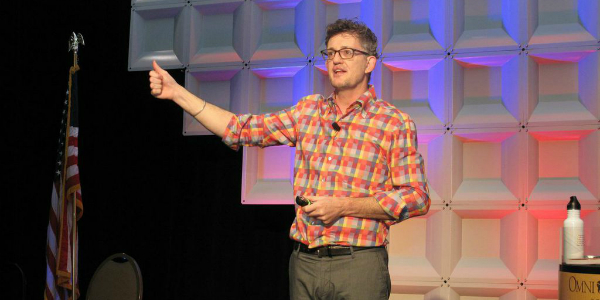How storytelling could change the work you do

It has been said that next to hunger and thirst, our most basic human need is for storytelling. – Khalil Gibran
The Scene: It’s Tuesday morning, November 4th in the Magnolia Ballroom in the Conference Center of the Omni Amelia Island Plantation Resort. Michael Bungay Stanier is delivering a (highly interactive) keynote speech to an audience of executives who work in and serve the credit union industry at the CUES CEO/Executive Team Network Conference. The focus is Doing Great Work and Michael is engaging the audience in a variety of participative activities. And most of us are probably thinking this is certainly not your average keynote!
The energy in the room is palpable—we’ve already completed three interactive exercises (and Michael is less than 15 minutes into his speech) where we met new people and shared insights about things we’ve learned and plan to takeaway from the conference thus far. But what we have done thus far was merely a set-up for the next step…
After sharing his definitions of bad, good, and great work illustrated with thought-provoking examples that make the distinctions clear, Michael has us complete a worksheet with a simple pie chart—how much of our time are we spending doing bad work, good work, and great work. He then sets us up for the next interaction…the one that really brings the message home (inspiring each of us to find a way to do more great work).
The Exercise: Michael’s instructions are simple—find someone you don’t know and sit down with them to share a story of a time in your life when you did what you consider truly great work. He provides an illustration of the type of story he wants us to share, demonstrating the power of narrative story and reminding us of the objective before turning it over to us to begin sharing our stories.
The Experience: My partner for this activity is Randy Smith (cofounder and publisher of CUInsight). Truth be told we have had a couple of passing interactions in the past, but this is the first time we will really have a chance to talk (so we’re not really breaking the rules of partnering with someone we don’t know).
The details of our individual stories don’t matter, but it’s worth noting the commonalities that emerged and impacts the process had on each of us.
Our stories both went back in time a bit, and each involved work we did that impacted the lives of others in a meaningful and lasting way. There were also brief personal glimpses (including things you don’t normally reveal in professional conversations) into our respective pasts revealed in our respective stories.
And as each of us listened we were drawn in to the vision the story created.
Though I can’t speak for my Randy, I know that listening to his story gave me a clear picture of what he believes and wants to achieve—how great work fulfills him on a personal level, as well as a professional level. And I noticed that as he listened to a couple of things I shared in my story his eyes softened a bit revealing the emotional connection the story created (and I’m fairly certain mine did the same as I listened to his story).
The Takeaways: Stories are powerful and worth sharing. The process of sharing your story with someone else affirms your beliefs and reminds you of what matters. The process of hearing someone else’s story reveals insight into what matters to them and takes your relationship to another level (I have little doubt that the next time we see each other either Randy or I will refer to the stories we shared and probably ask each other how much great work we’ve been doing lately).
More important, the act of sharing your story about a time when you did great work will remind you of what fulfills you and be powerful motivator for realigning your daily efforts to enable you to do more of it!
The Recommended Action: Think about the power of story and how it can change the work you do. Find someone on your team you are comfortable sharing with and tell your narrative of a time when you did great work. Ask them to do the same. And don’t forget to find ways to capture and share the stories of the impacts your credit union has had in the lives of your members—those are the ones that will focus your team and lead them to do great work that grows your business!
An Important Caveat: It’s important to realize that what makes storytelling powerful is that stories touch us at a personal and emotional level. I think that’s why Michael had us move back to our original seats immediately after the exercise—to allow us to process the experience privately. For me that was important and it is something I recommend when you share your stories.

